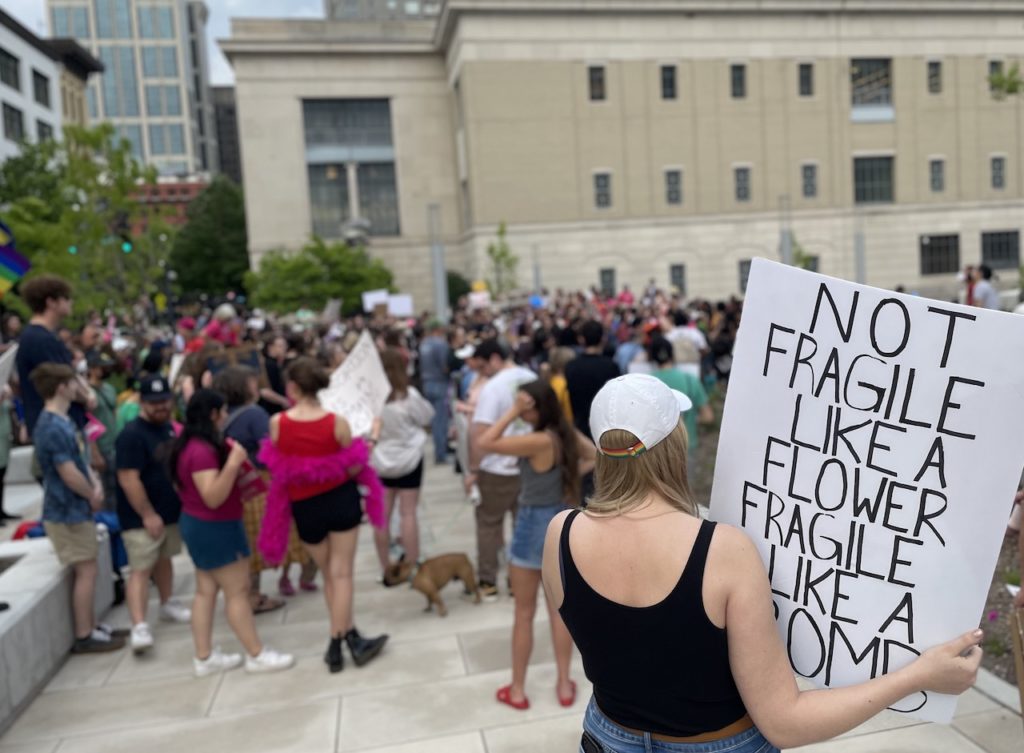
The expected reversal of Roe v. Wade generated a wave of questions about abortion in Tennessee. Two experts answered listener questions on Wednesday’s episode of This Is Nashville, excerpted below.
What kinds of abortions are legal in Tennessee?
“Abortion is still legal in Tennessee — every form of abortion,” says Robyn Baldridge, president of Abortion Care Tennessee.
Tennessee’s trigger ban wouldn’t take effect until 30 days after the U.S. Supreme Court officially overturns Roe v. Wade.
Separate from the draft Supreme Court opinion, there is one new abortion restriction in Tennessee that will criminalize misuse of abortion medication. Doctors could be charged with a felony for prescribing through a telehealth visit and sending pills in the mail, though the law is mostly intended to stop out-of-state doctors in the event Roe is overturned. “If you are going to one of the clinics in the state, then it is legal to access a medication abortion and an in-clinic procedure,” Baldridge says.
Where can you get an abortion?
Tennessee has six clinics currently operating (mapped out here), though Baldridge says the Planned Parenthood clinic in Nashville is not always offering surgical procedures. A more recent addition is Carafem in Mount Juliet. Planned Parenthood has a clinic in Knoxville that was burned by an arsonist, but the nonprofit said as recently as last week it is still planning to rebuild.
However, several listeners who described their own recent abortion experiences say they already found it more convenient to travel out of state where they could be seen more quickly. One woman said that going to Washington, D.C., for an abortion last month cost several hundred dollars less than the procedure in Tennessee, and that it did not involve a mandatory waiting period. She was also allowed to have someone else alongside her for the appointment.
What’s the difference between Plan B medication and abortion medication?
“They are two very different medications,” says Dr. Ivana Thompson, board certified OB-GYN practicing at Vanderbilt University Medical Center.
Medication abortion consists of mifepristone, commonly referred to as the abortion pill. It stops a pregnancy from growing, Thompson says. The second medication, misoprostol, opens the cervix and causes the uterus to cramp and expel the pregnancy tissue.
Plan B, however, should not be affected in the event of a Tennessee ban on abortions.
Plan B is emergency contraception, also known as the “morning after” pill. It reduces risk of pregnancy by delaying when a woman releases an egg or ovulates. “It’s important to know that when people take Plan B, if they have an established pregnancy in the uterus it does not interrupt that pregnancy and it also does not harm that pregnancy,” Thompson says.
Since Tennessee’s trigger ban would not make exceptions for lethal anomalies in a fetus, what are the medical consequences of carrying a nonviable pregnancy to term?
Patients are at risk of having a hemorrhage or an infection, Thompson says.
“Pregnancy — itself — is a risky condition,” she says, adding that anyone can develop a blood clot, high blood pressure or diabetes.
And there’s an emotional toll.
“People will be asked about their pregnancy by others, or people will touch their bellies. And for folks who have the situation where the baby inside as a lethal anomaly, that can be really distressing,” Thompson says.
What would the trigger ban in Tennessee mean for those who are trying to conceive and might need abortive care for a failed pregnancy?
The law (read here) only outlines this exception: “to prevent the death of the pregnant woman” or “irreversible impairment of bodily function.”
Baldridge calls this “tricky language.” There’s no exception for pregnancies outside the uterus, which are common for patients using in vitro fertilization.
“Anyone who is doing anything related to pregnancy is going to be affected by this,” she says.
WPLN queremos escuchar a sus historias personales del aborto. Puedes compartir en español aquí. WPLN News is seeking personal stories and questions about abortion in Tennessee. You can write to us here.


